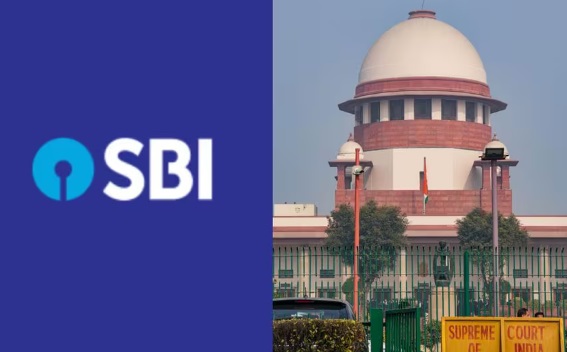
Supreme Court Criticizes SBI Over Electoral Bonds: Seeks Progress Update After 26 Days
In the Electoral Bonds case, the Supreme Court has instructed the State Bank of India to reveal information regarding electoral bonds by the end of business hours on March 12th.
In the hearing of the Electoral Bonds case, the Supreme Court reprimanded the State Bank of India (SBI) on Monday for failing to adhere to its directive of disclosing electoral bond donor details to the Election Commission of India (EC) by March 6. The SBI’s plea for an extension until June 30 was rejected by the Supreme Court, and it directed the bank to provide the details by the end of business hours on March 12. Additionally, the apex court instructed the ECI to publish the information on its official website by 5 pm on March 15.
The State Bank of India was questioned by a five-judge Constitution bench of the Supreme Court, asking about the actions taken in the past 26 days. The bench noted that the bank’s application did not provide details on this matter.
Beginning the crucial hearing, the bench led by Chief Justice of India DY Chandrachud stated that it had directed the SBI to provide a “simple disclosure” in accordance with the court’s ruling.
“The SBI simply needs to unseal the cover, gather the information, and provide it to the Election Commission,” remarked the bench, which also includes justices Sanjiv Khanna, BR Gavai, JB Pardiwala, and Manoj Misra.
The State Bank of India had requested an extension until June 30 to reveal the specifics of every electoral bond cashed by political parties prior to the scheme’s termination.
Another petition, which called for the commencement of contempt proceedings against the SBI, was considered during the hearing.

Electoral bonds case in Supreme Court: Top updates
- On February 15, a five-judge constitution bench declared the Centre’s electoral bonds scheme as “unconstitutional” and directed the Election Commission of India (ECI) to reveal donor details, donation figures, and recipients by March 13.
- Following this, the court instructed the SBI, the authorized financial entity for the program, to provide information regarding electoral bonds bought after April 12, 2019, to the ECI by March 6.
- The ECI was then assigned the responsibility of making this information available on its official website by March 13.
- Nonetheless, on March 4, the SBI submitted a plea to the Supreme Court requesting an extension until June 30 to disclose information regarding the electoral bonds that had been cashed, citing the time-consuming nature of retrieving and cross-referencing data from multiple sources.
- The NGOs Association for Democratic Reforms and Common Cause lodged a distinct appeal, urging the court to commence contempt proceedings against the bank for purportedly disregarding the apex court’s directive.
- The plea argued that the timing of SBI’s application was intentional, with the aim of concealing donor and donation amount details from the public ahead of the upcoming Lok Sabha elections.
- The plea asserted that electoral bonds are easily traceable, as evidenced by SBI’s maintenance of a confidential record containing unique numbers identifying donors and the recipient political parties. Additionally, the contempt petition argued that any form of financial anonymity in political party funding contradicts the principles of participatory democracy and the public’s right to information, as guaranteed under Article 19(1)(a) of the Constitution.
- The petition stressed the significance of providing information about electoral bonds to enable voters to make well-informed choices, highlighting the essential role of transparency in the electoral system.


